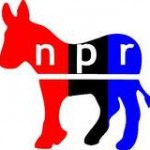 I’ve been getting some interesting feedback — part slapped wrist and part empathetic shrug — for my schoolgirl error regarding my last post about Alec Baldwin and NPR. The NY Phil broadcasts its concerts directly through radio stations, and not, as I erroneously wrote, via National Public Radio.
I’ve been getting some interesting feedback — part slapped wrist and part empathetic shrug — for my schoolgirl error regarding my last post about Alec Baldwin and NPR. The NY Phil broadcasts its concerts directly through radio stations, and not, as I erroneously wrote, via National Public Radio.
I’m embarrassed about misattributing Baldwin’s relationship with public radio to NPR. If I turn on the radio and I hear the announcer say “this is NPR,” I assume that I’m listening to NPR. I suspect I’m not alone in this assumption.
Of course, I ought to know better: I’m a music presenter for a San Francisco public radio station after all! But, in my defense, I’m a rookie radio host, a foreigner, and way too busy trying to keep up with the demands of putting out a weekly radio program to stop to consider the intricacies of the relationship between NPR, PRI, APM and the local stations that put out the content. But clearly it’s important for me to know this stuff and I stand humble and corrected and grateful to the folks who set me straight via email over the last day or so.
Here’s reader Matthew Westphal in answer to my confusion (thanks Matthew for allowing me to use your comments):
People confuse them all the time.
And NPR is probably perfectly happy to let that confusion continue.
After all, if people donate to NPR, or to the stations that pay NPR dues, because they love A Prairie Home Companion or This American Life or The Takeaway, why would NPR want to mess that up?The stations are definitely happy to let the confusion continue: they want – they need – to have listener dollars go to them (the stations) rather than to NPR or PRI or APM.
If I remember correctly, after Joan Kroc died and left $200 million to NPR, the network (NPR itself) figured there might be more money out there from similar sources and was preparing to start fundraising to that end. The member stations went ballistic at the idea that NPR would compete for donor dollars with the stations to whom it charges dues. So NPR backed off.
I do worry that we’re now in a period where the distinction – notably between NPR and the stations – is important. If NPR loses federal money, it will survive. But if the Corporation for Public Broadcasting (the channel for federal funding) is eliminated, many individual public radio stations, especially in less populated areas, will probably have to close. (The latest version of the legislation doesn’t cut federal funding for stations, but it forbids stations from using the funds to pay dues to NPR or otherwise acquire NPR programming.)
